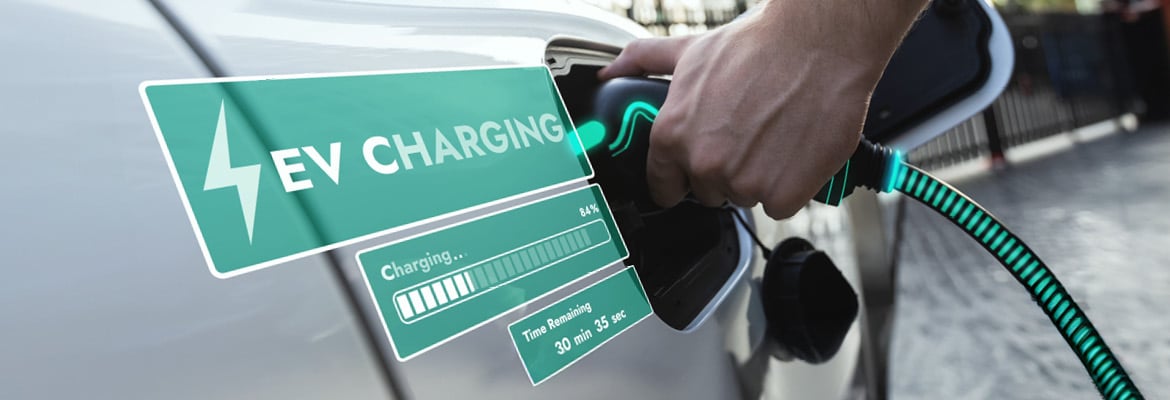Author(s)
Many companies rely on fleet vehicles to transport goods, provide services and maintain a competitive edge. As such, effective fleet management has become a crucial aspect of running a successful business.
In this comprehensive guide, we’ll dive into the various aspects of fleet management, from the different types of fleets to the role of a fleet manager and the benefits of utilizing fleet management software. We’ll also explore the top trends shaping the industry in 2024 and discuss how fleet management can help improve your bottom line.
What is fleet management?
Fleet management is the process of overseeing and coordinating a company’s fleet of vehicles. It encompasses everything from acquiring and maintaining vehicles to scheduling routes and drivers. Effective fleet management is crucial to a successful business and requires careful planning and execution.
What are the different kinds of fleets?
Fleets come in all shapes and sizes and vary depending on the industry and specific needs of the business. The most common fleets are emergency, utility, transportation, trucking and delivery.
- Emergency: Used by police, fire and ambulance, these vehicles are built to respond rapidly to emergencies and require specialized equipment and training.
- Utility: Companies that provide essential services such as power, water and telecommunications may use bucket trucks and service vans.
- Public Transportation: Typically consists of taxi services or buses.
- Trucking: These vehicles transport high volumes of loads over long distances and must follow specific weight and height requirements.
- Delivery: Used specifically for delivering goods, such as food or purchases from retailers and can range from small local couriers to large national logistics companies.
- Commercial fleets: Used by businesses and organizations that require multiple vehicles for operations such as sales or service companies and government agencies,
- Rental car companies: Frequently used by travelers, business professionals and individuals in need of temporary transportation.
What does a fleet manager do?
The fleet manager oversees all movement and activity within the fleet. They are also responsible for ensuring their vehicles comply with compliance and regulations and that drivers complete all tasks safely and on time. Key responsibilities of a fleet manager include:
- Fleet tracking: By using GPS tracking technology, vehicles can be located at any given time, no matter the size of the fleet.
- Service and maintenance: Managers must build and follow maintenance programs to improve vehicle longevity, performance and maintain driver safety.
- Driver safety: Critical to their role, fleet managers implement telematics, like dash cameras, to monitor driving habits and significantly reduce the risk of accidents.
- Driver retention: Fleet managers are responsible for retaining employees through mentorship programs, building a healthy work environment and more.
- Compliance: There are legislation and regulations fleet companies are required to follow. To avoid costly fines, managers must follow guidelines and stay current with any changes impacting their fleets.
- Vehicle management: Fleet managers are responsible for vehicle purchases, involving thorough negotiations with manufacturers. Their job duties also remarketing of vehicles, possibly selling vehicles at auction.
Why is fleet management important?
Fleet management is crucial for businesses because it significantly boosts operational efficiency. With the help of advanced telematics technology, companies can improve driver safety by keeping a close watch on their driving habits. This includes tracking details like braking and acceleration patterns and even aggressive cornering.
Furthermore, fleet management allows for precise monitoring of vehicle location and smart route planning. This, along with routine maintenance checks, helps maintain the health of the vehicles, which in turn leads to a decrease in fuel costs.
Adhering to a regular maintenance schedule also minimizes the risk of unexpected vehicle problems. This not only extends the life of the vehicles but also ensures they are safe to use. Hence, effective fleet management is vital for cost-saving, promoting safety and enhancing overall business performance.
The top 6 fleet management trends in 2024
Fleet management is an ever-evolving industry. New tools, techniques and technologies are emerging—all requiring new strategies for success that must be met to get ahead of the competition. Here are some of the latest trends in fleet management:
- Predictive maintenance
Predictive maintenance is becoming increasingly popular in fleet management due to the numerous benefits it provides. It uses real-time data and analytics to predict when maintenance will be necessary, allowing for proactive repairs, minimizing downtime and reducing costs associated with emergency situations. Some companies have already implemented predictive maintenance in their fleet management systems, resulting in decreased maintenance costs and increased vehicle uptime.
- Fleet electrification
Vehicle electrification is a hot topic in the automotive industry as government regulations have pushed automakers towards selling zero-emissions vehicles by 2030. To reduce their carbon footprint, fleet operators are also transitioning to EVs and slowly phasing out of standard internal combustion engine (ICE) vehicles. For example, rental car giant, Hertz, is converting to EVs and currently has 50,000 electric vehicles in its fleet.
- Increase in fleet telematics
Telematics can help fleet managers overcome operational challenges by enhancing reports and using data and analytics to handle issues.
Moreover, fleet managers and stakeholders can use information from onboard sensors, GPS tracking and more to gain a comprehensive view of a vehicle’s performance and health, in addition to tracking driver behavior and improving route optimization.
- Mobility-as-a-service (MaaS)
As Mobility-as-a-Service (MaaS) gains traction, fleet managers can increasingly tailor their offerings and move away from conventional methods. The global MaaS market is projected to grow 23.3% by 2030, according to Markets and Markets.
Fleet owners are exploring new avenues with company-owned vehicles, including leasing options. MaaS encourages re-evaluating fleet management processes, allowing for the adoption of vehicle-sharing strategies. This results in more efficient use of idle cars, better budget control and a reduced carbon footprint. Additionally, key fleet metrics will transform, shifting focus from vehicle quantities and data to timing, journey success rates, attendance rates and yearly expenses.
- Greater focus on safety
Drivers often work long hours on the road, increasing their risk of fatigue or distractions. Consequently, fleet management companies are combating these safety risks by rewarding safe driving practices and fostering a culture of safety. In addition, telematics is playing a key role in improving fleet safety. By using technology, managers can identify areas of improvement and provide feedback and coaching.
Vehicle upkeep is also critical to safety. By regularly maintaining and inspecting each vehicle, drivers and managers can identify potential safety hazards and address the need for repairs before vehicles hit the road.
- Upskilling technicians
Employing skilled technicians is an important part of any fleet company’s success. By investing in the right training, companies can ensure their technicians are up to date on industry changes and best practices. This helps improve their service quality, increase efficiency and reduce downtime. Additionally, upskilling fleet technicians helps reduce costs associated with recruiting and retaining skilled employees and reduces the need for costly repairs due to outdated or incorrect maintenance practices.
Furthermore, ensuring your technicians have the skillset to repair and maintain EVs is essential as fleets shift towards electric vehicles. As more EVs enter the market, the industry faces a shortage of skilled technicians. According to the Bureau of Labor Statistics, the United States will need around 80,000 electrician jobs through 2031. This includes technicians to install and repair electric vehicles and EV chargers.
The benefits of fleet management software
Fleet management software optimizes operations and helps fleet managers make data-driven decisions. It streamlines vehicle tracking, maintenance scheduling, fuel consumption and driver behavior analysis. Moreover, the software gives managers valuable insights into their fleet’s performance, identifies areas for improvement and ultimately reduces operational costs while increasing overall efficiency.
One of the key features of fleet management software is real-time GPS tracking, enabling managers to monitor the location, speed and route of every vehicle in their fleet. This technology includes advanced analytics and reporting tools that provide a wealth of information on various aspects of performance, such as fuel consumption patterns, vehicle maintenance history and driver safety metrics.
The best fleet management software in 2024
With the ever-evolving landscape of fleet management solutions, finding the right software that caters to your company’s specific needs is crucial. Here are Montway’s top picks:
- Samsara: The best choice for companies with very large fleets, Samsara’s features are devoted to safety. One of our favorite features is that Samsara allows recording devices that track driver behavior and performance. It also includes dispatching and GPS tracking, fuel and maintenance monitoring and custom dashboards for optimal reporting. Pricing is offered through custom quotes.
- Fleetio: We like Fleetio for its easy-to-use features that help track time, fuel and mileage. In addition, fleet management companies can view built-in purchase and service history tracking. Plans are fairly priced, starting at $3 per vehicle, with a minimum of 5 vehicles required.
- Onfleet: With excellent customer service and technology catered to small businesses, Onfleet’s software is known best for simplifying task tracking. Packed with features including route optimization, proof of delivery and ETA notifications, Onfleet connects to thousands of apps to help automate tasks such as accounting details, tracking vehicles service history and more. Pricing starts at $550 monthly.
- Aguza Fleet: This product’s standout features include featured maintenance, driver scoring, geofencing and predictive maintenance. Its GPS tracking implementation is easy to install in fleet vehicles and offers a driver rewards program to maintain driver safety. Prices start at $25 per month for each vehicle.
How fleet management software can improve your bottom line
Fleet management software offers a myriad of benefits to businesses and fleet managers, enabling them to optimize their operations and make informed decisions. This innovative technology streamlines the entire fleet management process by providing real-time data on vehicle location, fuel consumption and maintenance schedules. As a result, businesses can reduce operational costs, improve driver safety and enhance overall efficiency.
Furthermore, fleet software offers advanced analytics capabilities that allow fleet managers to identify trends and patterns, facilitating proactive measures to address potential issues before they escalate. With its comprehensive reporting features, fleet management software also ensures regulatory compliance and simplifies record-keeping tasks.
Adopting fleet management software is a strategic investment that empowers organizations to stay competitive in an ever-evolving landscape.
FAQs about fleet management
What are the components of fleet management?
Fleet management encompasses several key components: vehicle acquisition and disposal, maintenance and repair, fuel management, driver management, route optimization, safety and compliance, telematics and tracking, and reporting and analytics. These aspects work together to ensure the selection of appropriate vehicles, cost-effective operations, skilled and monitored drivers, optimized routes, adherence to regulations and data-driven improvements for overall fleet efficiency and performance.
Why is fleet management important?
In today’s competitive business landscape, efficient fleet management is crucial for success. Adopting a comprehensive fleet management strategy ensures your company stays ahead of the curve. By managing fuel, maintenance, and administrative costs, fleet management can directly contribute to increased profitability and improved customer satisfaction.
Without effective fleet management, your business may be exposed to potential risks that could impact your bottom line, including excessive operational expenses, poor route planning and non-compliance with safety regulations.
How much do fleet managers make?
Compensation for fleet managers in the United States differs based on factors such as geographical location, level of experience and the size of the fleet under their supervision. Generally, fleet managers’ yearly earnings may range from approximately $62,0000 to $99,000, according to Glassdoor. These numbers can vary due to additional incentives like benefits, bonuses and profit-sharing plans offered by some employers.
The road to success in fleet management
Effective fleet management is essential for companies looking to improve efficiency, reduce costs and maintain compliance with ever-changing regulations. Businesses can optimize their operations and stay ahead of the competition by understanding the different types of fleets, the responsibilities of a fleet manager, and the benefits of utilizing fleet management software.
It’s critical to have a flexible and reliable auto transport company to move your fleet. From across the state or the country, Montway Auto Transport has the services and technology to help fleet companies of all sizes move and manage their vehicles, meeting ever-changing employee and consumer needs. Visit Montway.com/Logistics or call 888-998-4161 to learn more.








